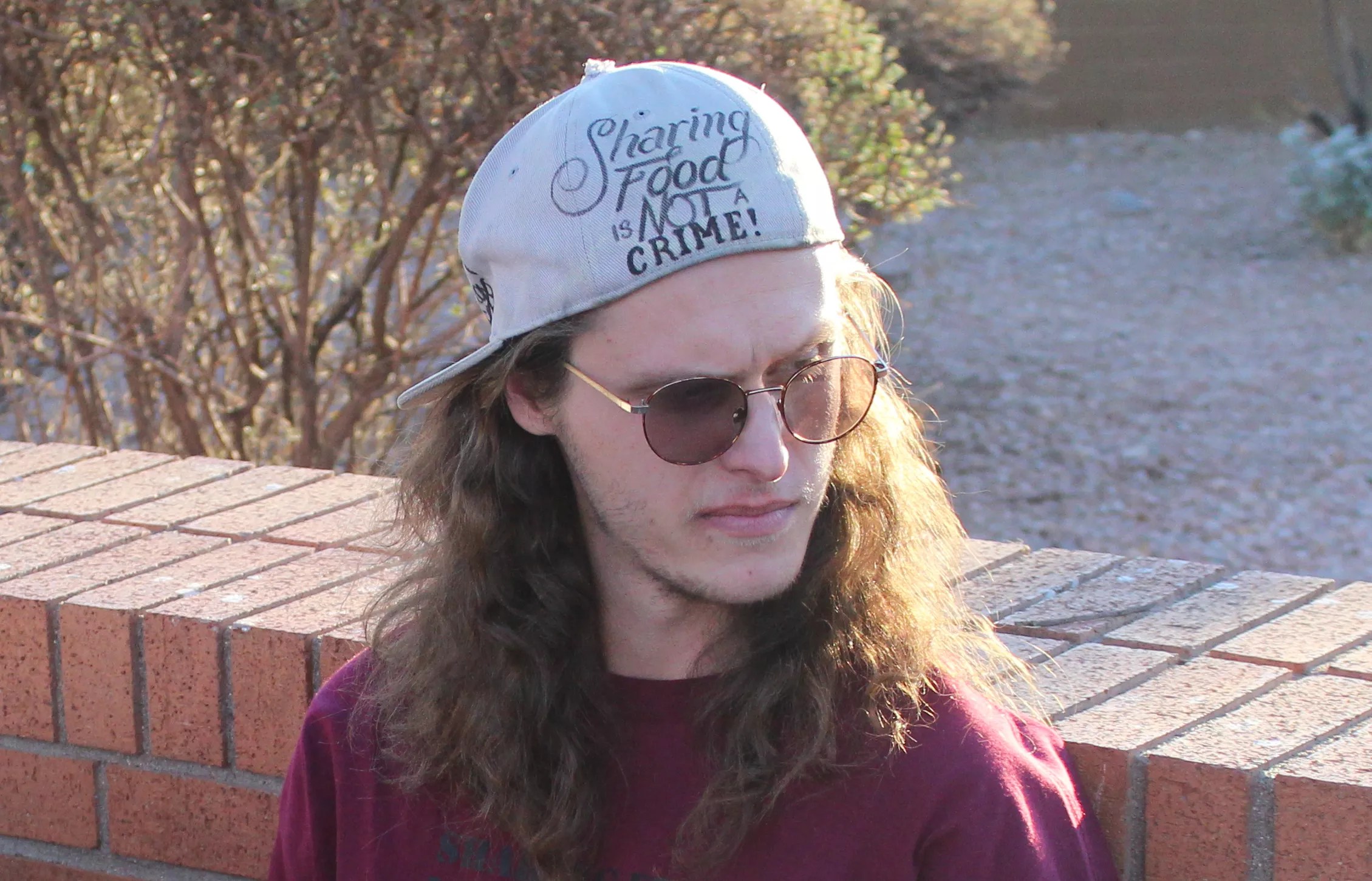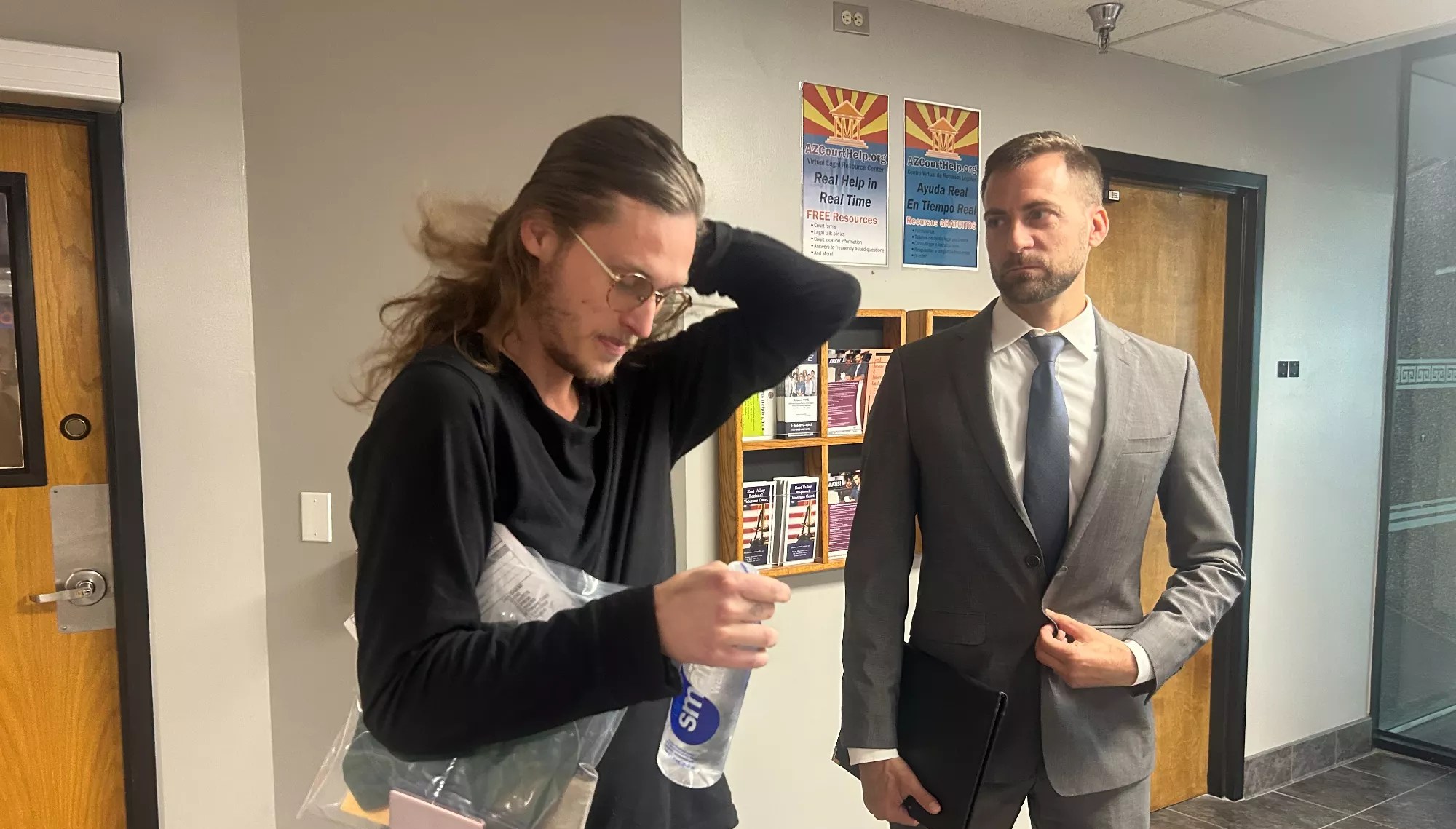
TJ L’Heureux

Audio By Carbonatix
Editor’s note: This story was originally published Aug. 7 and was updated Aug. 15 to include a statement from Tempe Municipal Court Judge Pro Tempore Linda Lory
***
It was about a year ago that plainclothes Tempe detectives first arrested Austin Davis, the 24-year-old poet and Arizona State University graduate whose grassroots quest to feed and help the homeless has irked the city and its top officials. Tuesday, the city marked the anniversary by throwing him in jail again.
The evening of Aug. 5, Tempe police arrested Davis and deposited him in jail, the third night he’s spent behind bars in the last year. On Wednesday, when he was released, he told Phoenix New Times his experience was markedly different from the harrowing, restless first time he experienced the slammer last year.
“I got some good sleep, actually,” Davis said. “Almost everyone in there is just people I know from the streets, so we were just bullshitting all night.”
Davis was in high spirits probably because of a strange turn of events. At an arraignment hearing Wednesday morning, the city not only dropped the charge that led to his arrest but also ended Davis’ ban from Tempe parks, which was supposed to last until May 2026.
Four days prior, Davis had filmed the arrest of two unhoused people, who were allegedly detained for trespassing in city parks. One was handcuffed by Tempe officers near Mouer Park and forced to lie on his back over a patch of rocks, just steps away from the park’s grass. Davis filmed the arrests without incident and later posted them to Facebook.
But on Tuesday, Davis was walking his dog when four Tempe officers approached him and told him he was under arrest for “interfering with judicial proceedings,” an apparent reference to filming officers.
“They pulled up the video on the Facebook post and then they started trying to make me feel like I had done something wrong by tagging the police department,” Davis told New Times on Wednesday. “This isn’t because of any crime I did – this is because I took that video and it looks really bad on the city. They know that.”
In court on Wednesday morning, Davis was dressed in a black long-sleeve shirt and jeans, shackled around the waist, wrist and ankles. He was surrounded by at least half a dozen other men, most of whom were in orange jumpsuits. By hearing’s end, he was free from his shackles – and free to return to city parks.
A free man
Arresting Davis may have been a big blunder on the part of Tempe police. Davis attorney Russell Facente told New Times that even Tempe city prosecutor Alan Witt was dismayed at the decision to arrest his client. Facente recalled Witt remarking, “I can’t believe they arrested him for what he did.”
Witt did not respond to a request from New Times to confirm that statement. However, the sentiment was reflected in the plea deal reached by Witt and Facente. The city dropped the “interfering with judicial proceedings” charge while Davis pleaded guilty to violating his probation.
One of the videos Davis took shows that he stepped onto a sidewalk adjacent to a city park, which is technically a violation of the probation terms that banned him from the parks. However, Davis noted he only did so at the orders of a cop.
“In the video, the officer says get out of the street because I was standing on the street,” Davis said. “And so I stepped up onto the curb.”
That may have factored into Davis’ new plea agreement. In exchange for pleading guilty to violating probation and spending the night in jail, the city agreed to end his probation nine months early.
“Any restrictions he had regarding being in a city park have been lifted,” Tempe spokesperson Kris Baxter-Ging told New Times in a written statement Thursday. “He is still required to follow all park rules and regulations, like any other person, and would be subject to any penalties that violations of the law would entail.”
As long as Tempe park rangers haven’t issued a separate trespass warning against Davis, that means he will be able to enter Tempe’s parks and again organize events to feed unhoused people with his nonprofit organization, AZ Hugs.
“If I’m understanding correctly, I can go back in the parks – which would be huge,” Davis told New Times outside Tempe Municipal Court following his release. “I mean, that’s everything.”
Facente is holding Davis back momentarily. As of Thursday, park rangers head Michael Spykes had not responded to Facente’s inquiry about outstanding trespass warnings. The city told him it would have to file a records request for that information, though Baxter-Ging told New Times that “there are no reasons that Austin Davis cannot be in a city park.”
But what explains the city’s 180 on Davis’ probation? It may have had something to do with the police department’s overzealous reaction to its officers being filmed. “(Witt) also rightly mentioned that (Davis) spent another day in jail – which is a serious matter,” Facente noted. “I mean, jail is not a hotel stay.” Facente also said that if the plea deal wasn’t satisfactory, Davis would have had a strong case against the city.
“He had a very valid reason for filming – not only is it his right to film, but we know that not all Tempe officers treat unhoused people with dignity or sometimes use excessive force,” Facente said. “And also, this was a person in 100-degree heat laying down on their back in the gravel with no water.”

Austin Davis and his attorney, Russell Facente, after his release on Wednesday.
TJ L’Heureux
A history of Tempe vs. Davis
Davis’ feeling of triumph outside the courthouse was tinged with disbelief after Pro Tempore Judge Linda Lory, who approved the plea deal, praised him. “Thank you again for your service,” the judge said, adding, “Keep doing what you’re doing.”
“I was telling Russell, ‘This is the twilight zone,'” Davis laughed. “I get arrested for nothing and then everything is dropped?”
In a statement to New Times, Lory clarified that “at no time did I condone or excuse Mr. Austin Davis’ conduct that violated the law.” The remarks she made, she added, “were intended only to acknowledge Mr. Austin’s benevolent humanitarian service. Such efforts are worthy of recognition when they are carried out lawfully and in a manner that strengthens, rather than undermines, respect for the rule of law.”
If Davis is indeed allowed to enter the parks again without being detained, it will be an astounding turning of the tide.
For well over a year, the city hounded Davis for organizing meals for unhoused people in city parks. The city first hauled him into court for running the events without a city-approved permit – which officials denied him when he applied – and then threw him in jail for trespassing and banned him from all parks for a year and a half as part of a plea deal.
After Davis was banned, concerned community members like community activist Ron Tapscott and now-state Sen. Lauren Kuby stepped up to run them in his absence. Tapscott and others established a private club – New Deal Meal – and required unhoused people to sign in to circumvent the city’s requirement to obtain a permit for public events. At first, the city cited Tapscott for the events but later dropped the charges.
Davis, Tapscott and Tempe resident Jane Parker also are suing the city for allegedly infringing on their constitutional rights by targeting efforts to feed and care for unhoused people. But changes to city code have placed that case in limbo.
Last month, the Tempe City Council unanimously passed a controversial update to its special events permit law, even though 77 people spoke out against it during the six-hour meeting. A citizen-led initiative to repeal the update collected signatures to place the issue before voters in March. Those signatures are now in the process of being verified and counted.
With the fate of the new law hanging in the balance, Facente said the team suing Tempe is considering how to proceed.